Hamilton: J’cans not feeling impact of macroeconomic successes on development
ECONOMIC SPECIALIST Professor Rosalea Hamilton says there are questions to be answered about whether Jamaica’s positive macroeconomic performance is facilitating the development of the country, pointing to a labour force where 70 per cent are uneducated.
Hamilton, the director of the Institute of Law and Economics at the University of Technology, said there are positives in terms of the trend in the reduction of the debt-to-GDP ratio.
She said there are other indicators, including the broad fiscal management and the record-low unemployment rate of 4.2 per cent.
“But in every one of those variables we can ask, how it is facilitating development – the development of the people of Jamaica, the institutions of Jamaica, the communities of Jamaica? That’s the issue,” Hamilton told The Gleaner yesterday.
Her comments followed an Advocates Network Post-Budget Governance press conference held yesterday at the Spanish Court Hotel in New Kingston.
The professor said successive governments had gone on record about the macroeconomic fundamentals being correct.
Still, she said Jamaicans are waiting to see the developmental outcomes, which are not happening.
In February, Prime Minister Andrew Holness said his administration was facing a real “conundrum” of turning frowns into smiles, even as it presided over a strong economic policy that has pulled Jamaica back from the “brink of bankruptcy”.
Noting at that time a record-low unemployment rate, creating 150,000 new jobs since 2016, an improved credit rating of BB-, 10 consecutive quarters of economic growth, a balance of payments current account surplus of US$352 million, and a near 74 per cent debt-to-GDP ratio, Holness said getting inflation within the targeted band of four to six per cent will be the linchpin between a solid economy and Jamaicans benefiting from it.
He said there is a sense that his Government has done well in terms of its economic policy, but translating the positive statistics into smiles is the bottom line.
“That is the real issue,” he said then.
Hamilton said Jamaicans must ask themselves whether these are the correct indicators that ought to be measured and monitored to achieve desired outcomes.
She said a legitimate question was whether policymakers should be tracking GDP per capita and monitoring this annually as an indicator of the living standards of the average Jamaican.
She said this could be used to measure whether all the other macro fundamentals were leading to the outcomes that Jamaicans want.
“It begs the question of whether the indicators that we are looking at are sufficient.
“I think we have to appreciate that when we talk about economic development, we’re talking about several indicators. It’s a multidimensional idea of development,” said Hamilton.
She said this could not simply be only about economic growth, but also human and social development as well as political governance indicators.
She said a pooling of that would ultimately trigger what Jamaicans have been looking for.
Hamilton said in discussing Jamaica’s sustainable development goals, there were several indicators, but the country must find the clutch of indicators that make sense of its historical, social, and economic journey.
Looked at that way, she said, issues such as Jamaica’s undercapitalisation become centre.
“We are, for example, maintaining a labour force that is undereducated. Nearly 70 per cent of our labour force have passed no exams or have not passed the required thresholds. They can only do skilled-level one and two-type jobs,” said Hamilton.
The director said if Jamaica wants to become competitive in a global economy where there is innovation and high-level thinking, the education level of the labour force must be shifted to that of globally competitive countries.
“If you look at the data in terms of those of us with degrees, we’re talking about 14 per cent, but if you look at a comparable figure in Organisation for Economic Co-operation and Development countries, it is closer to 40 per cent.
“So we have a lot to do, and I must say that the minister of finance recognised and saw that and talked about the fact that he has to improve our skills to get better value for the jobs that we have, higher wages, and so on. But we’ve not yet heard very clearly what’s the mechanism to do it,” Hamilton said.
She said that while a “massive” study had been done, the question of where exactly the country is still stands as well as the projection and time frame in which that turnaround would be seen.
“In the absence of that, we just have to hope that our leaders will take us to the promised land. We think that’s not enough. We need the voices of the Jamaican people to take us to that promised land.”

